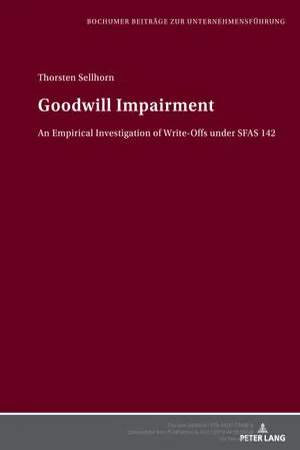Goodwill Impairment (Volume 70.0)
About this book
In 2001, goodwill amortization in the US was eliminated in favor of an impairment-only approach, which, according to critics, gives managers vast discretion and opportunities for earnings management. Prior research suggests that discretionary asset write-offs are associated with economic factors and managers' financial reporting objectives. Based on a systematic literature review, this study investigates for a comprehensive sample of US firms the determinants of goodwill write-off behavior. Regression analysis shows that write-off behavior is significantly explained by firms' economic properties. Only in large, high-profile firms, incentives appear to be significant determinants. These findings suggest that the impairment-only approach does capture goodwill impairment at least to some extent.
Frequently asked questions
- Essential is ideal for learners and professionals who enjoy exploring a wide range of subjects. Access the Essential Library with 800,000+ trusted titles and best-sellers across business, personal growth, and the humanities. Includes unlimited reading time and Standard Read Aloud voice.
- Complete: Perfect for advanced learners and researchers needing full, unrestricted access. Unlock 1.4M+ books across hundreds of subjects, including academic and specialized titles. The Complete Plan also includes advanced features like Premium Read Aloud and Research Assistant.
Please note we cannot support devices running on iOS 13 and Android 7 or earlier. Learn more about using the app.
Information
Table of contents
- Cover
- List of abbreviations
- List of symbols
- List of figures
- List of tables
- 1 Introduction
- 2 The goodwill debate
- 3 Empirical research on discretionary asset write-offs
- 4 Discretionary properties of the impairment-only approach
- 5 Empirical investigation of write-off determinants
- 6 Conclusion
- Appendix
- List of references
- List of accounting pronouncements and legal provisions
